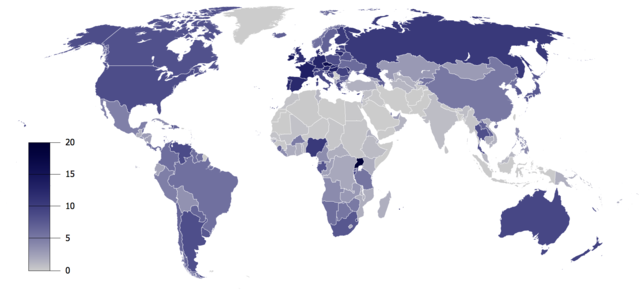Loading AI tools
Effects of alcohol consumption on cardiovascular health From Wikipedia, the free encyclopedia
In a 2018 study on 599,912 drinkers, a roughly linear association was found with alcohol consumption and a higher risk of stroke, coronary artery disease excluding myocardial infarction, heart failure, fatal hypertensive disease, and fatal aortic aneurysm, even for moderate drinkers.[2][non-primary source needed] Alcohol abuse may also cause occupational cardiovascular disease.[3] The American Heart Association states that people who are currently non-drinkers should not start drinking alcohol.[4]

Excessive alcohol intake is associated with an elevated risk of alcoholic liver disease (ALD), heart failure, some cancers, and accidental injury, and is a leading cause of preventable death in industrialized countries.[5] Some studies have suggested that one drink per day may have cardiovascular benefits. However, these studies are controversial,[6] and the common view is that no level of alcohol consumption improves health.[7] There is far more evidence for the harmful effects of alcohol than for any beneficial effects.[8] It is also recognized that the alcohol industry may promote the unsubstantiated benefits of moderate drinking.[9]
Some early reviews showed that light alcohol consumption may have a protective effect on cardiovascular health. For instance, a meta-analysis from 2010 found that patients with cardiovascular disease who were light to moderate alcohol consumers, were less likely to suffer from cardiovascular and all-cause mortality.[10] However, the researchers warned against encouraging cardiovascular patients who do not regularly consume alcohol to start drinking due to lack of controlled intervention studies and evidence.[10]
Several possible mechanisms have been suggested for the cardioprotective effect of alcohol. These include glucose control, lipid metabolism, and metabolism as a whole.[11] However, another possible explanation is that the cardioprotective effect is only a confounding research result.[12] A logical possibility is that some of the alcohol abstainers in research studies previously drank excessively and had undermined their health. After they quit they were categorized as non-drinkers, which in turn lead to more sick people in the non-drinkers category. To test this hypothesis, a 2019 meta analysis has recategorized people accordingly. As a result, no benefit was found for alcohol consumption of any dosage, moreover, alcohol was detrimental to health even at low doses.[13]
The American Heart Association states that drinking too much alcohol increases health risks including cardiovascular disease precursors such as obesity, high blood pressure, high triglycerides and also heart attacks and strokes. They warn that "We’ve all seen the headlines about studies associating light or moderate drinking with health benefits and reduced mortality. Some researchers have suggested there are health benefits from wine, especially red wine, and that a glass a day can be good for the heart. But there’s more to the story. No research has proved a cause-and-effect link between drinking alcohol and better heart health."[6]
The World Heart Federation (2022) recommends against any alcohol intake for optimal heart health.[14][15]
It has also been pointed out that the studies suggesting a positive link between red wine consumption and heart health had flawed methodology in the form of comparing two sets of people which were not actually appropriately paired.[16]
It is well known that alcohol consumption increases the risk of hypertension. Hence, many clinical trials examined the effect of reduction in alcohol consumption on blood pressure. Systematic review and meta-analysis have shown that effect of alcohol reduction on blood pressure is dose dependent.[17]
In 2010, a systematic review reported that moderate consumption of alcohol does not cause harm to people with cardiovascular disease. However, the authors did not encourage people to start drinking alcohol in the hope of any benefit.[18]
Seamless Wikipedia browsing. On steroids.
Every time you click a link to Wikipedia, Wiktionary or Wikiquote in your browser's search results, it will show the modern Wikiwand interface.
Wikiwand extension is a five stars, simple, with minimum permission required to keep your browsing private, safe and transparent.